杭州二中2012届高三第六次月考英语试题
- 格式:doc
- 大小:563.50 KB
- 文档页数:10
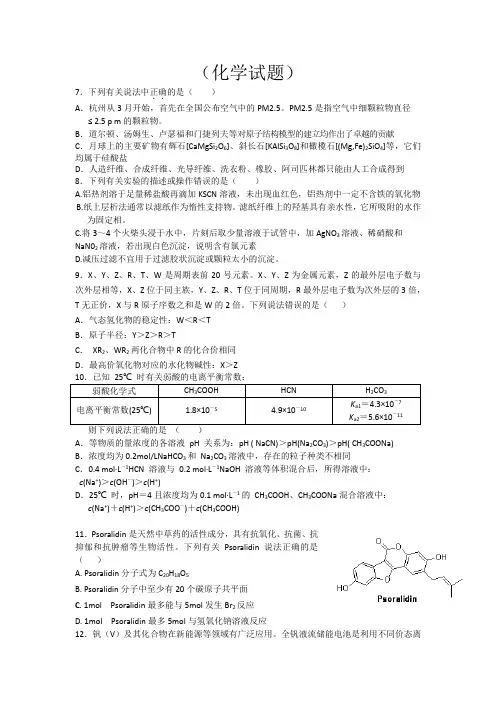
(化学试题)7.下列有关说法中正确..的是()A.杭州从3月开始,首先在全国公布空气中的PM2.5。
PM2.5是指空气中细颗粒物直径≤ 2.5 p m的颗粒物。
B.道尔顿、汤姆生、卢瑟福和门捷列夫等对原子结构模型的建立均作出了卓越的贡献C.月球上的主要矿物有辉石[CaMgSi2O6]、斜长石[KAlSi3O8]和橄榄石[(Mg,Fe)2SiO4]等,它们均属于硅酸盐D.人造纤维、合成纤维、光导纤维、洗衣粉、橡胶、阿司匹林都只能由人工合成得到8.下列有关实验的描述或操作错误的是()A.铝热剂溶于足量稀盐酸再滴加KSCN溶液,未出现血红色,铝热剂中一定不含铁的氧化物B.纸上层析法通常以滤纸作为惰性支持物。
滤纸纤维上的羟基具有亲水性,它所吸附的水作为固定相。
C.将3~4个火柴头浸于水中,片刻后取少量溶液于试管中,加AgNO3溶液、稀硝酸和NaN02溶液,若出现白色沉淀,说明含有氯元素D.减压过滤不宜用于过滤胶状沉淀或颗粒太小的沉淀。
9.X、Y、Z、R、T、W是周期表前20号元素。
X、Y、Z为金属元素,Z的最外层电子数与次外层相等,X、Z位于同主族,Y、Z、R、T位于同周期,R最外层电子数为次外层的3倍,T无正价,X与R原子序数之和是W的2倍。
下列说法错误的是()A.气态氢化物的稳定性:W<R<TB.原子半径:Y>Z>R>TC.XR2、WR2两化合物中R的化合价相同D.最高价氧化物对应的水化物碱性:X>Z10.已知25℃时有关弱酸的电离平衡常数:弱酸化学式CH3COOH HCN H2CO3电离平衡常数(25℃) 1.8×10-5 4.9×10-10K a1=4.3×10-7 K a2=5.6×10-11则下列说法正确的是()A.等物质的量浓度的各溶液pH 关系为:pH ( NaCN)>pH(Na2CO3)>pH( CH3COONa) B.浓度均为0.2mol/LNaHCO3和Na2CO3溶液中,存在的粒子种类不相同C.0.4 mol·L-1HCN 溶液与0.2 mol·L-1NaOH 溶液等体积混合后,所得溶液中:c(Na+)>c(OH-)>c(H+)D.25℃时,pH=4且浓度均为0.1 mol·L-1的CH3COOH、CH3COONa混合溶液中:c(Na+)+c(H+)>c(CH3COO-)+c(CH3COOH)11.Psoralidin是天然中草药的活性成分,具有抗氧化、抗菌、抗抑郁和抗肿瘤等生物活性。
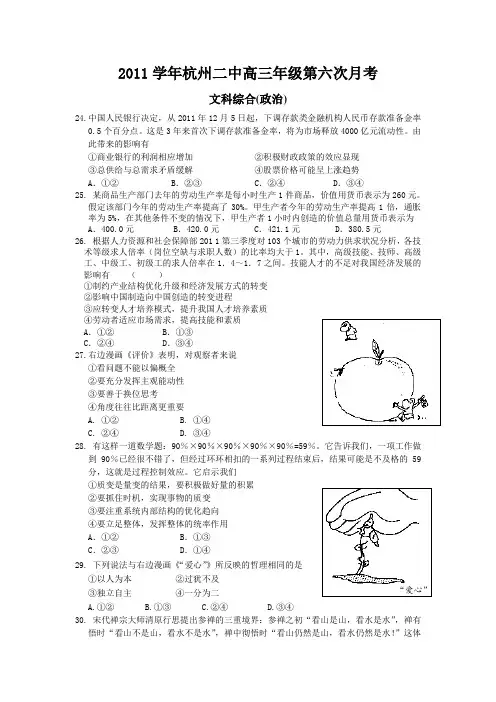
2011学年杭州二中高三年级第六次月考文科综合(政治)24.中国人民银行决定,从2011年12月5日起,下调存款类金融机构人民币存款准备金率0.5个百分点。
这是3年来首次下调存款准备金率,将为市场释放4000亿元流动性。
由此带来的影响有①商业银行的利润相应增加 ②积极财政政策的效应显现③总供给与总需求矛盾缓解 ④股票价格可能呈上涨趋势A .①②B .②③C .②④D .③④25. 某商品生产部门去年的劳动生产率是每小时生产1件商品,价值用货币表示为260元。
假定该部门今年的劳动生产率提高了30%。
甲生产者今年的劳动生产率提高1倍,通胀率为5%,在其他条件不变的情况下,甲生产者1小时内创造的价值总量用货币表示为A .400.0元B .420.0元C .421.1元D .380.5元26. 根据人力资源和社会保障部201 1第三季度对103个城市的劳动力供求状况分析,各技术等级求人倍率(岗位空缺与求职人数)的比率均大于1。
其中,高级技能、技师、高级工、中级工、初级工的求人倍率在1.4~1.7之间。
技能人才的不足对我国经济发展的影响有 ( )①制约产业结构优化升级和经济发展方式的转变②影响中国制造向中国创造的转变进程③应转变人才培养模式,提升我国人才培养素质④劳动者适应市场需求,提高技能和素质A .①②B .①③C .②④D .③④27.右边漫画《评价》表明,对观察者来说①看问题不能以偏概全②要充分发挥主观能动性③要善于换位思考④角度往往比距离更重要A. ①②B. ①④C. ②④D. ③④28. 有这样一道数学题:90%×90%×90%×90%×90%=59%。
它告诉我们,一项工作做到90%已经很不错了,但经过环环相扣的一系列过程结束后,结果可能是不及格的59分,这就是过程控制效应。
它启示我们①质变是量变的结果,要积极做好量的积累②要抓住时机,实现事物的质变③要注重系统内部结构的优化趋向④要立足整体,发挥整体的统率作用A .①②B .①③C .②③D .①④29. 下列说法与右边漫画《“爱心”》所反映的哲理相同的是①以人为本 ②过犹不及③独立自主 ④一分为二 A.①② B.①③ C.②④ D.③④30. 宋代禅宗大师清原行思提出参禅的三重境界:参禅之初“看山是山,看水是水”,禅有悟时“看山不是山,看水不是水”,禅中彻悟时“看山仍然是山,看水仍然是水!”这体“爱心”现的哲理是()A.认识因其形象具体而具有直观性B.认识因其最终回归而具有重复性C.认识因其不断变化而具有不确定性D.认识因其循环上升而具有深刻性31.人大代表,首先要能“代”,就是代表人民,为人民办事;其次要善于“表”,就是要能充分表达选民的意愿、呼声。
![浙江省杭州二中2012-学高一下学期期中英语试题 Word版含答案[ 高考]](https://uimg.taocdn.com/cdb26279ccbff121dd368377.webp)
杭州二中2012学年第二学期高一年级期中考试英语试卷本试卷分第I卷(选择题)和第II卷(非选择题)两部分,共100分,考试时间90分钟第I卷(三部分,共70分)第一部分听力(共两节,满分15分)第一节(共5小题:每小题1分,满分5分)听下面5段对话。
每段对话后有一个小题,从题中所给的A、B、C三个选项中选出最佳选项,并标在试卷的相应位置。
听完每段对话后,你都有10秒钟的时间来回答有关小题和阅读下一小题。
每段对话仅读一遍。
1. How did the woman get home?A. By air.B. By train.C. By bus.2. What did Kate do?A. She sang a song.B. She took a nap in her room.C. She listened to some music.3. Where does this conversation probably take place?A. In an office.B. At the man’sC. At the woman’s.4. What does the woman enjoy doing now?A. Playing the piano.B. Singing.C. Playing tennis5. What did Bob do yesterday?A. He went out with his family.B. He attended a birthday party.C. He went for a barbecue with his friend.第二节(共10小题,每小题1分,满分10分) ks5u听下面4段对话或独白。
每段对话或独白后有几个小题,从题中所给的A、B、C三个选项中选出最佳选项,并标在试卷的相应位置。
听每段对话或独白前,你将有时间阅读各个小题,每小题5秒钟。
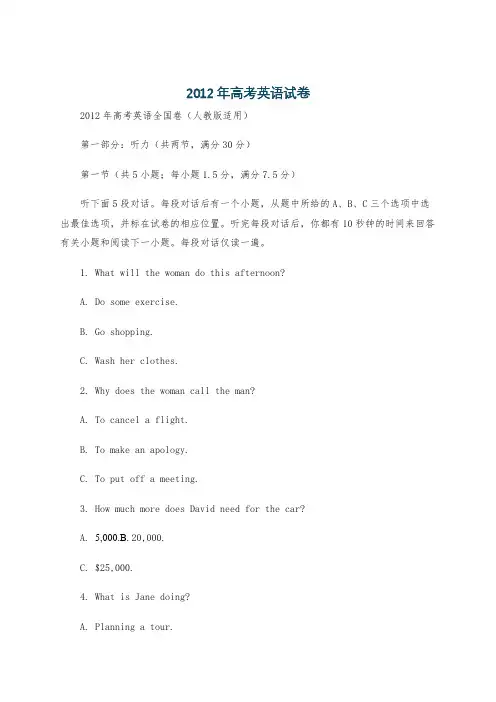
2012年高考英语试卷2012年高考英语全国卷(人教版适用)第一部分:听力(共两节,满分30分)第一节(共5小题;每小题1.5分,满分7.5分)听下面5段对话。
每段对话后有一个小题,从题中所给的A、B、C三个选项中选出最佳选项,并标在试卷的相应位置。
听完每段对话后,你都有10秒钟的时间来回答有关小题和阅读下一小题。
每段对话仅读一遍。
1. What will the woman do this afternoon?A. Do some exercise.B. Go shopping.C. Wash her clothes.2. Why does the woman call the man?A. To cancel a flight.B. To make an apology.C. To put off a meeting.3. How much more does David need for the car?A. 5,000.B. 20,000.C. $25,000.4. What is Jane doing?A. Planning a tour.B. Calling her father.C. Asking for leave.5. How does the man feel?A. Tired.B. Dizzy.C. Thirsty.第二节(共15小题;每小题1.5分,满分22.5分)听下面5段对话或独白。
每段对话或独白后有几个小题,从题中所给的A、B、C 三个选项中选出最佳选项,并标在试卷的相应位置。
听每段对话或独白前,你将有时间阅读各个小题,每小题5秒钟;听完后,各小题将给出5秒钟的作答时间。
每段对话或独白读两遍。
听第6段材料,回答第6、7题。
6. Where does the conversation probably take place?A. In a hotel.B. In a restaurant.C. In a supermarket.7. What does the man ask the woman to do?A. Sign her name.B. Confirm the order.C. Pay a deposit.听第7段材料,回答第8、9题。
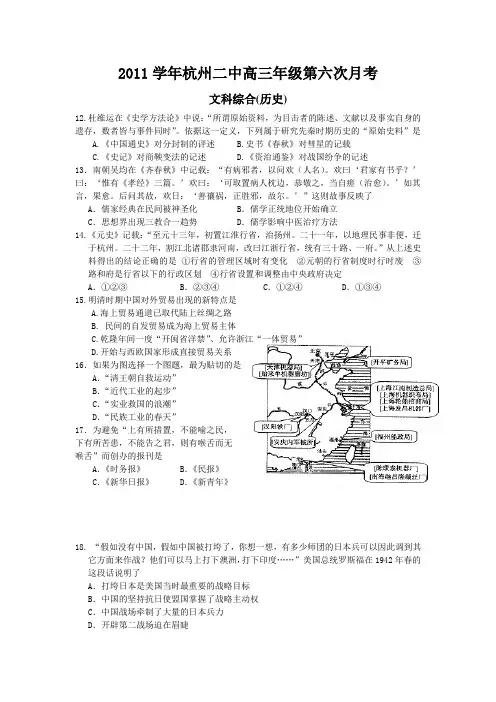
2011学年杭州二中高三年级第六次月考文科综合(历史)12.杜维运在《史学方法论》中说:“所谓原始资料,为目击者的陈述、文献以及事实自身的遗存,数者皆与事件同时”。
依据这一定义,下列属于研究先秦时期历史的“原始史料”是A.《中国通史》对分封制的评述B.史书《春秋》对彗星的记载C.《史记》对商鞅变法的记述D.《资治通鉴》对战国纷争的记述13.南朝吴均在《齐春秋》中记载:“有病邪者,以问欢(人名)。
欢曰‘君家有书乎?’曰:‘惟有《孝经》三篇。
’欢曰:‘可取置病人枕边,恭敬之,当自瘥(治愈)。
’如其言,果愈。
后问其故,欢日:‘善禳祸,正胜邪,故尔。
’”这则故事反映了A.儒家经典在民间被神圣化 B.儒学正统地位开始确立C.思想界出现三教合一趋势 D.儒学影响中医治疗方法14.《元史》记载:“至元十三年,初置江淮行省,治扬州。
二十一年,以地理民事非便,迁于杭州。
二十二年,割江北诸郡隶河南,改曰江浙行省,统有三十路、一府。
”从上述史料得出的结论正确的是①行省的管理区域时有变化②元朝的行省制度时行时废③路和府是行省以下的行政区划④行省设置和调整由中央政府决定A.①②③ B.②③④C.①②④ D.①③④15.明清时期中国对外贸易出现的新特点是A.海上贸易通道已取代陆上丝绸之路B. 民间的自发贸易成为海上贸易主体C.乾隆年间一度“开闽省洋禁”、允许浙江“一体贸易”D.开始与西欧国家形成直接贸易关系16.如果为图选择一个图题,最为贴切的是A.“清王朝自救运动”B.“近代工业的起步”C.“实业救国的浪潮”D.“民族工业的春天”17.为避免“上有所措置,不能喻之民,下有所苦患,不能告之君,则有喉舌而无喉舌”而创办的报刊是A.《时务报》B.《民报》C.《新华日报》D.《新青年》18. “假如没有中国,假如中国被打垮了,你想一想,有多少师团的日本兵可以因此调到其它方面来作战?他们可以马上打下澳洲,打下印度……”美国总统罗斯福在1942年春的这段话说明了A.打垮日本是美国当时最重要的战略目标B.中国的坚持抗日使盟国掌握了战略主动权C.中国战场牵制了大量的日本兵力D.开辟第二战场迫在眉睫19.下面是一位同学整理的历史读书笔记,记录了某一历史时期的情况:农业强调“以粮为纲”;工业强调“以钢为纲”,三面红旗迎风飘扬,六亿人民奋发图强;适当缩小基本建设规模,统筹兼顾,全面安排。
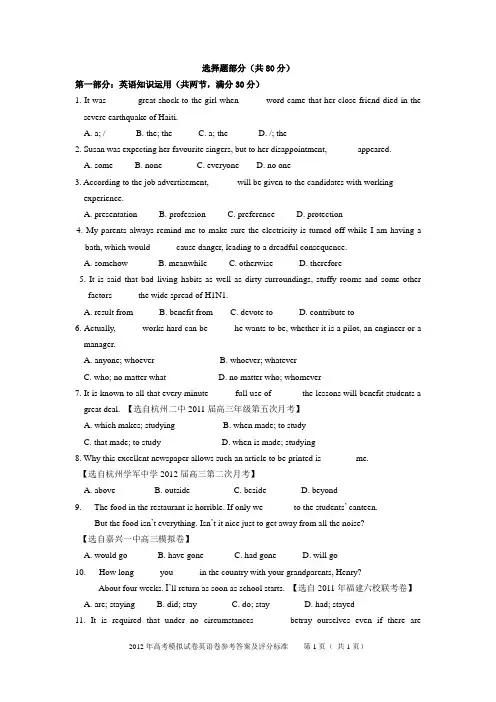
选择题部分(共80分)第一部分:英语知识运用(共两节,满分30分)1. It was ______ great shock to the girl when _____ word came that her close friend died in the severe earthquake of Haiti.A. a; /B. the; theC. a; theD. /; the2. Susan was expecting her favourite singers, but to her disappointment, ______ appeared.A. someB. noneC. everyoneD. no one3. According to the job advertisement, ______will be given to the candidates with working experience.A. presentationB. professionC. preferenceD. protection4. My parents always remind me to make sure the electricity is turned off while I am having abath, which would _____ cause danger, leading to a dreadful consequence.A. somehowB. meanwhileC. otherwiseD. therefore5. It is said that bad living habits as well as dirty surroundings, stuffy rooms and some otherfactors _____ the wide spread of H1N1.A. result fromB. benefit fromC. devote toD. contribute to6. Actually, _____ works hard can be _____ he wants to be, whether it is a pilot, an engineer or a manager.A. anyone; whoeverB. whoever; whateverC. who; no matter whatD. no matter who; whomever7. It is known to all that every minute _____ full use of ______ the lessons will benefit students a great deal. 【选自杭州二中2011届高三年级第五次月考】A. which makes; studyingB. when made; to studyC. that made; to studyD. when is made; studying8. Why this excellent newspaper allows such an article to be printed is _______ me.【选自杭州学军中学2012届高三第二次月考】A. aboveB. outsideC. besideD. beyond9. --- The food in the restaurant is horrible. If only we ______ to the students‟ canteen.--- But the food isn‟t everything. Isn‟t it nice just to get away from all the noise?【选自嘉兴一中高三模拟卷】A. would goB. have goneC. had goneD. will go10. --- How long _____ you _____ in the country with your grandparents, Henry?--- About four weeks. I‟ll return as soon as school starts. 【选自2011年福建六校联考卷】A. are; stayingB. did; stayC. do; stayD. had; stayed11. It is required that under no circumstances ______ betray ourselves even if there aretemptations like money or beauty. 【选自杭州第二中学高三模拟试卷】A. we willB. should weC. weD. we shall12. Although Rio knew little about marketing, he succeeded ______ other more well-informedmanagers failed. 【选自重庆八中2012届高三下学期第一次月考卷】A. asB. unlessC. whatD. where13. Tom does speak Chinese well, but his reading and writing skills leave much ______.【选自嘉兴一中2012届高三第三次模拟试题卷】A. to improveB. to be improvedC. being improvedD. having improved14. It is the discovery of Cao Cao‟s tomb, _____ was made in Anyang, Henan province, _____ hasreceived widespread attention. 【浙大附中2011年最后模拟考试卷】A. where; whichB. where; thatC. that; whichD. which; that15. --- Did Mark win the 100-meter race?--- _______. He did ______ I. 【选自2011年浙江五校第一次联考卷】A. Yes; no better thanB. No; no worse thanC. Yes; much worse thanD. No; no better than16. --- Did you have a wonderful time at the ball last night?--- ______! I‟ve never had a more wonderful time all my life.【选自杭州第二中学高三模拟试卷】A. You betB. No problemC. Don‟t mention itD. That‟s right17. Viewers continue to watch TV ______ they complain about the quality of the programming. 【选自上海市普通高等学校2011年高三春季招生考试卷】A. even thoughB. as ifC. as long asD. unless18. Remember to pack more winter clothes into your suitcase. The winter in Chicago _____ be extremely cold. 【选自上海市普通高等学校2011年高三春季招生考试卷】A. mustB. willC. canD. shall19. In terms of the knowledge of science, few students in our class can really ______ Christopher. 【选自2011年江苏镇江高三统考卷】A. suitB. compareC. winD. match20. Because of the nuclear crisis caused by the earthquake in Japan, many people lined up to buysalt ______ seeking protection from radiation. 【选自嘉兴一中2011年第三次模拟试题卷】A. in face of B. in search of C. in terms of D. in hopes of第一节:完形填空(共20小题;每小题1分,满分20分)When I was growing up in America, I was 21 of my mother's Chinese English, for which she was often treated 22 . People in department stores, at banks, and at restaurants did not give her good 23 , or take her seriously. 24 they pretended not to understand her, oreven acted 25 they did not hear her.My mother has long realized the 26 of her English as well. When I was fifteen, she 27 have me call people on the phone to 28 I was she. I was forced to ask for information or even to yell at people who had been rude to her. One time 1 had to call her stockbroker (股票经纪人). I said in an adolescent voice that was not very 29 , "This is Mrs. Tan." And my mother was standing beside me, 30 loudly, "Why he don't send me check, already two week late." And then, in perfect English I said, "I'm getting rather 31 . You agreed to send the check two weeks ago, but it32 . "Then s he talked more loudly. "What h e want? I come to New York tell him front of his boss. "And so I 33 the stockbroker again, "I can't 34 any more excuse. If I don't receive the cheek immediately, I am going to have to speak to your manager when I am in New York next week. "The next week we 35 in New York. While I was sitting there 36 , my mother,the real Mrs. Tan, was shouting to his boss in her broken English.When I was a teen ager, my mother's broken English 37 me. But now, I see it differently. To me, my mother's English is perfectly clear, perfectly natural. It is my mother tongue. Her language, as I hear it, is vivid, direct, and full of observation and 38 . It was the language that helped 39 the way 1 saw things, expressed ideas, and made40 of the world.【文章选自2010年普通高等学校招生全国统一考试广东卷阅读理解】21. A. proud B. ashamed C. afraid D. convinced 【原创】22. A. anxiously B. instantly C. carefully D. unfairly 【原创】23. A. checks B. attitudes C. expressions D. service 【原创】24. A. otherwise B. therefore C. instead D. however 【原创】25. A. even though B. as if C. now that D. if only 【原创】26. A. features B. disadvantages C. limitations D. effects 【原创】27. A. could B. would C. might D. should 【原创】28. A. pretend B. protect C. prevent D. prefer 【原创】29. A. awkward B. convincing C. perfect D. useful 【原创】30. A. whispering B. shouting C. talking D. crying 【原创】31. A. pleased B. irritated C. concerned D. interested 【原创】32. A. hasn‟t arrived B. doesn‟t arrive C. didn‟t arrive D. isn‟t to arrive【原创】33. A. turned to B. spoke to C. came to D. referred to 【原创】34. A. accept B. hold C. tolerate D. notice 【原创】35. A. set off B. ended up C. settled down D. called on 【原创】36. A. red-faced B. excited C. bored D. scared 【原创】37. A. annoyed B. embarrassed C. frightened D. amused 【原创】38. A. value B. importance C. use D. wisdom 【原创】39. A. set B. shape C. choose D. build 【原创】40. A. sense B. fun C. use D. comment 【原创】第二部分:阅读理解(共两节。
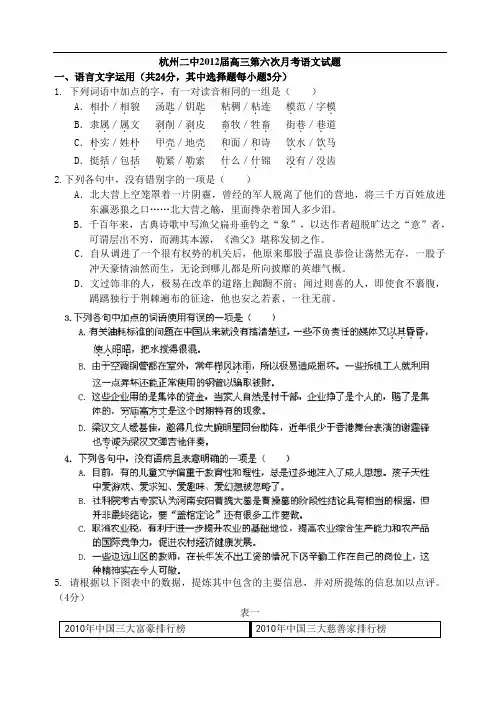
杭州二中2012届高三第六次月考语文试题一、语言文字运用(共24分,其中选择题每小题3分)1.下列词语中加点的字,有一对读音相同的一组是()A.相.扑/相.貌汤匙./钥匙.粘.稠/粘.连模.范/字模.B.隶属./属.文剥.削/剥.皮畜.牧/牲畜.街巷./巷.道C.朴.实/姓朴.甲壳./地壳.和.面/和.诗饮.水/饮.马D.挺括./包括.勒.紧/勒.索什.么/什.锦没.有/没.齿2.下列各句中,没有错别字的一项是()A.北大营上空笼罩着一片阴霾,曾经的军人脱离了他们的营地,将三千万百姓放进东瀛恶狼之口……北大营之觞,里面搀杂着国人多少泪。
B.千百年来,古典诗歌中写渔父扁舟垂钓之“象”,以达作者超脱旷达之“意”者,可谓层出不穷,而溯其本源,《渔父》堪称发韧之作。
C.自从调进了一个很有权势的机关后,他原来那股子温良恭俭让荡然无存,一股子冲天豪情油然而生,无论到哪儿都是所向披靡的英雄气概。
D.文过饰非的人,极易在改革的道路上踟蹰不前;闻过则喜的人,即使食不裹腹,踽踽独行于荆棘遍布的征途,他也安之若素、一往无前。
5. 请根据以下图表中的数据,提炼其中包含的主要信息,并对所提炼的信息加以点评。
(4分)表一(以上数据来自互联网)信息:点评:6. 根据下面情境,写两条提示语。
(4分)为了震慑小偷及遇到突发事故时有据可查,越来越多的商家在自己的店铺里装上监控系统,并在醒目处贴上提示语。
其中有些提示语让顾客看后觉得很不舒服,比如:每一个摄像头都是一双监视你的眼睛。
但有些提示语表达的是同样的意思,却让顾客觉得非常温暖,比如:⑴或者⑵。
⑴⑵。
7. 仿照下面的示例,自选话题,写一个句子。
要求以“激情”或“行动”为话题,句式相同或相近,修辞手法相同,内容有意蕴。
(4分)如果不赋予时间创造性的价值,它就像小溪的流水,只能带走凋零的青春花瓣,却不能浮起成就的远洋货轮。
________________________________________________________________________二、现代文阅读(共29分,其中选择题每小题3分)(一)阅读下面的文字,回答8—10题。
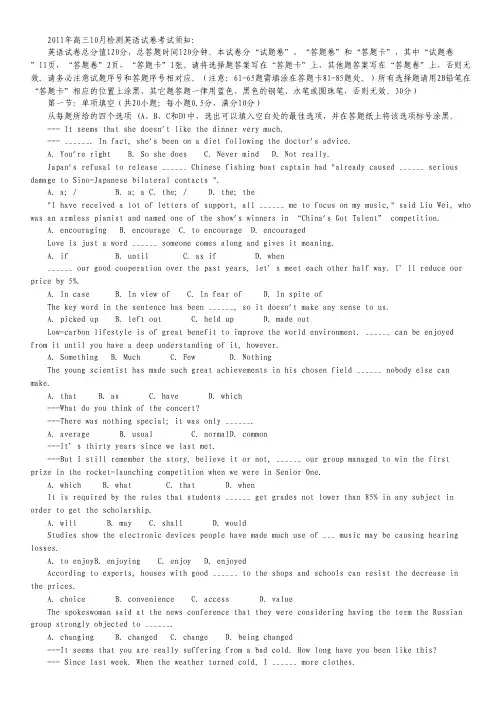
2011年高三10月检测英语试卷考试须知: 英语试卷总分值120分,总答题时间120分钟。
本试卷分“试题卷”、“答题卷”和“答题卡”,其中“试题卷”11页,“答题卷”2页,“答题卡”1张。
请将选择题答案写在“答题卡”上,其他题答案写在“答题卷”上,否则无效。
请务必注意试题序号和答题序号相对应。
(注意:61-65题需填涂在答题卡81-85题处。
)所有选择题请用2B铅笔在“答题卡”相应的位置上涂黑,其它题答题一律用蓝色、黑色的钢笔、水笔或圆珠笔,否则无效。
30分) 第一节:单项填空(共20小题;每小题0.5分,满分10分) 从每题所给的四个选项 (A、B、C和D)中,选出可以填入空白处的最佳选项,并在答题纸上将该选项标号涂黑。
--- It seems that she doesn't like the dinner very much. --- ______. In fact, she's been on a diet following the doctor's advice.A. You're rightB. So she doesC. Never mindD. Not really. Japan's refusal to release ______ Chinese fishing boat captain had "already caused ______ serious damage to Sino-Japanese bilateral contacts ".A. a; /B. a; aC. the; /D. the; the "I have received a lot of letters of support, all ______ me to focus on my music," said Liu Wei, who was an armless pianist and named one of the show's winners in “China's Got Talent” competition.A. encouragingB. encourageC. to encourageD. encouraged Love is just a word ______ someone comes along and gives it meaning.A. ifB. untilC. as ifD. when ______ our good cooperation over the past years, let’s meet each other half way. I’ll reduce our price by 5%.A. In caseB. In view ofC. In fear ofD. In spite of The key word in the sentence has been ______, so it doesn't make any sense to us.A. picked upB. left outC. held upD. made out Low-carbon lifestyle is of great benefit to improve the world environment. ______ can be enjoyed from it until you have a deep understanding of it, however.A. SomethingB. MuchC. FewD. Nothing The young scientist has made such great achievements in his chosen field ______ nobody else can make.A. thatB. asC. haveD. which ---What do you think of the concert? ---There was nothing special; it was only ______.A. averageB. usualC. normalD. common ---It’s thirty years since we last met. ---But I still remember the story, believe it or not, ______ our group managed to win the first prize in the rocket-launching competition when we were in Senior One.A. whichB. whatC. thatD. when It is required by the rules that students ______ get grades not lower than 85% in any subject in order to get the scholarship.A. willB. mayC. shallD. would Studies show the electronic devices people have made much use of ___ music may be causing hearing losses.A. to enjoyB. enjoyingC. enjoyD. enjoyed According to experts, houses with good ______ to the shops and schools can resist the decrease in the prices.A. choiceB. convenienceC. accessD. value The spokeswoman said at the news conference that they were considering having the term the Russian group strongly objected to ______.A. changingB. changedC. changeD. being changed ---It seems that you are really suffering from a bad cold. How long have you been like this? --- Since last week. When the weather turned cold, I ______ more clothes.A. haven’t put onB. don’t put onC. hadn’t put onD. didn’t put on ---How do you find the club? ---I ______ it. Everyone is saying its management is going from bad to worse.A. couldn’t have joinedB. might have joinedC. would rather not have joinedD. would like to have joined On hearing the news, the president ______ his visit to Australia and returned home immediately.A. broke offB. went offC. kept offD. took off --- Why don't you try to do exercise to lose weight? --- I have tried everything but it has made little ______.A. effectB. resultC. conclusionD. difference --- I promise to go shopping with you if you help me with the housework. --- ______ You are the last person to keep a promise.A. That's great!B. Come off it!C. I don't agree.D. How come? ---Hard to imagine you bringing up 3 children all by yourself. ---______. Now they have all been independent.A. I have got used to thatB. Thank you for your complimentsC. I managed it somehowD. That’s it 第二节:完形填空(共20小题;每小题1分,满分20分) 阅读下面短文,掌握其大意,然后从21-40各题所给的四个选项(A、B、C和D)中,选出最佳选项,并在答题纸上将该选项标号涂黑。
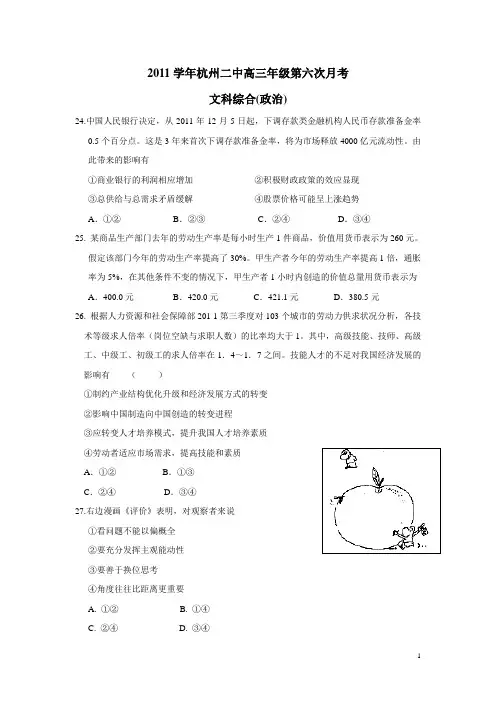
2011学年杭州二中高三年级第六次月考文科综合(政治)24.中国人民银行决定,从2011年12月5日起,下调存款类金融机构人民币存款准备金率0.5个百分点。
这是3年来首次下调存款准备金率,将为市场释放4000亿元流动性。
由此带来的影响有①商业银行的利润相应增加②积极财政政策的效应显现③总供给与总需求矛盾缓解④股票价格可能呈上涨趋势A.①②B.②③C.②④D.③④25. 某商品生产部门去年的劳动生产率是每小时生产1件商品,价值用货币表示为260元。
假定该部门今年的劳动生产率提高了30%。
甲生产者今年的劳动生产率提高1倍,通胀率为5%,在其他条件不变的情况下,甲生产者1小时内创造的价值总量用货币表示为A.400.0元B.420.0元C.421.1元D.380.5元26. 根据人力资源和社会保障部201 1第三季度对103个城市的劳动力供求状况分析,各技术等级求人倍率(岗位空缺与求职人数)的比率均大于1。
其中,高级技能、技师、高级工、中级工、初级工的求人倍率在1.4~1.7之间。
技能人才的不足对我国经济发展的影响有()①制约产业结构优化升级和经济发展方式的转变②影响中国制造向中国创造的转变进程③应转变人才培养模式,提升我国人才培养素质④劳动者适应市场需求,提高技能和素质A.①② B.①③C.②④D.③④27.右边漫画《评价》表明,对观察者来说①看问题不能以偏概全②要充分发挥主观能动性③要善于换位思考④角度往往比距离更重要A. ①②B. ①④C. ②④D. ③④28. 有这样一道数学题:90%×90%×90%×90%×90%=59%。
它告诉我们,一项工作做到90%已经很不错了,但经过环环相扣的一系列过程结束后,结果可能是不及格的59分,这就是过程控制效应。
它启示我们①质变是量变的结果,要积极做好量的积累②要抓住时机,实现事物的质变③要注重系统内部结构的优化趋向④要立足整体,发挥整体的统率作用A.①②B.①③C.②③D.①④“爱心”29. 下列说法与右边漫画《“爱心”》所反映的哲理相同的是①以人为本②过犹不及③独立自主④一分为二A.①②B.①③C.②④D.③④30. 宋代禅宗大师清原行思提出参禅的三重境界:参禅之初“看山是山,看水是水”,禅有悟时“看山不是山,看水不是水”,禅中彻悟时“看山仍然是山,看水仍然是水!”这体现的哲理是()A.认识因其形象具体而具有直观性B.认识因其最终回归而具有重复性C.认识因其不断变化而具有不确定性D.认识因其循环上升而具有深刻性31. 人大代表,首先要能“代”,就是代表人民,为人民办事;其次要善于“表”,就是要能充分表达选民的意愿、呼声。
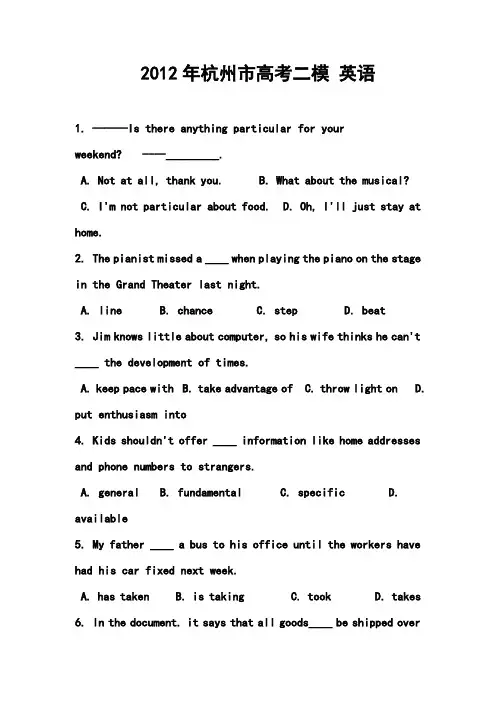
2012年杭州市高考二模英语1. ———Is there anything particular for yourweekend?----_________.A. Not at all, thank you.B. What about the musical?C. I'm not particular about food.D. Oh, I'll just stay at home.2.The pianist missed a ____ when playing the piano on the stage in the Grand Theater last night.A. lineB. chanceC. stepD. beat3.Jim knows little about computer, so his wife thinks he can't ____ the development of times.A. keep pace withB. take advantage ofC. throw light onD. put enthusiasm into4.Kids shouldn't offer ____ information like home addresses and phone numbers to strangers.A. generalB. fundamentalC. specificD. available5.My father ____ a bus to his office until the workers have had his car fixed next week.A. has takenB. is takingC. tookD. takes6.In the document. it says that all goods____ be shipped overbefore the due day.A. shallB. canC. mayD. will7.With her energy ___ the research on AIDS, Mrs. Mason cannot spare much time with her family.A. fixing onB. fixed onC. to fix onD. having fixed on8. —How soon will the employees in your factory get a rise? —Their pay increases gradually and ____ every few years. A. steadily B. sharply C. frequently D. vastly9. Do you think the reason ____ you gave for your absence is valid?A. asB. whatC. thatD. why10.____ the issues that arose over the talk last week,both sides announced their better coopera¬tion in the future.A. To settleB. Having settledC. SettlingD. Settled11. I'm not sure of the exact number, but____ speaking, I would say there are 1000 guests or so.A. honestlyB. strictlyC. properlyD. roughly12. Asked about the cause of the gas leaks, the president ofthe company claimed that it was still be¬ing ______ by a group of experts.A. investigatedB. exploredC. distinguishedD. founded13. What is concerning us greatly is ____ the workers held up in that area yesterday will be set free.A. thatB. whatC. whenD. which14. —____?——I can' t promise anything, but I' 11 do my best.A. Does this bus go to the airportB. Can I reach the airport by 9:00C. Excuse me, but how can I get to the airportD. Shall I take you to the airport15. —Hurry up! Your aunt should arrive at the station at any moment.—But the kids left the house in such a terrible ____ that I have to tidy it up.A. issueB. catastropheC. shapeD. mess16.Mr. Hill' s car alarm is always ____ in the middle of the night, which disturbs his neighbor' s sleep greatly.A. breaking offB. falling offC. going offD. taking off17. So long as you win the match to be held next week we' 11 be delighted ______ it happens.A. howeverB. whateverC. whereverD.whenever18.____ his research paper, Professor Reagan experienced various hardships and loneliness on the Antarctic exploration for nearly half a year.A. AccomplishingB. To accomplishC. AccomplishedD. Having accomplishedst week, Peter ____ in the national football match but for his knee injury.A. had playedB. would playC. playedD. would have played20.In my opinion, wine improves ____age, and it is the same with friendship.A. atB. withC. forD. in完形填空:Steve Kimball started a career in March as a school - bus driver for First Student Norwich.The morning of April 8 seemed21, Kimball recalled, except that he didn’t quite feel right. Noah got in the bus and noticed immediately that the driver didn’t22 well; he wasn’t talking and joking23the two of them are used to doing every morning. Throughout the brief ride to __24more riders , Noah kept asking Kimball, "Steve, are you all right?".Kimball said the boy' s persistence was getting him annoyed. So Noah25sent a quick text message to his parents26the driver was definitely sick but27he was OK. His father__28the bus company immediately. Soon the ambulance came over and drove Kimball to the nea¬rest___29."The doctor said I suffered a severe heart attack," Kimball said Thursday, __30 __recovering at his Norwich home. Kimball said. "God worked a miracle ___31___ Noah. He saved my life, plain and simple. "Kimball wasn't the only one___32. On Tuesday , First Student held a ceremony at Noah ' s school ___33him for his "heroic leadership. " Company officials _ 34him with a plaque ( g($) and a $50 prize."You are being __35for your quick thinking and showing great care and __36for your driver, and because of you, he will be just fine," the plaque ___37.Noah doesn't care for the sudden __38. He had to be coaxed (哄劝) by Kimball to attend Tuesday' s ceremony. "I just did what was the right ____39to do," he said.But Noah wasn't shy when asked whether he was40Steve's return to work.“Oh, yeah!” he said.21. A. strange B. normal C. noisy D. busy22. A. perform B. behave C. serve D. look23. A. as if B. in case C. the way D. now that24. A. pick up B. drop off C. pull up D. carry out25. A. calmly B. quietly C. faithfully D. sincerely26. A. when B. as C. which D. that27. A. admitted B. declared C. insisted D. indicated28. A. called B. reminded C. responded D. visited29. A. school B. neighborhood C. hospital D. bus-stop30. A. still B. even C. soon D. thus31. A. by B. for C. in D. without32. A. admirable B. desperate C. hopeful D. thankful33. A. in terms of B. in honor of C. in memory of D. in favor of34. A. provided B. sent C. supplied D. presented35. A. recognized B. involved C. approved D. remembered36. A. guidance B. concern C. curiosity D. determination37. A. agrees B. applauds C. reads D. writes38. A. celebration B. shock C. instruction D. excitement39. A. attitude B. thing C. person D. time40. A. looking up to B. setting along C. living up to D. lookingforward to第二部分:阅读理解(共两节。
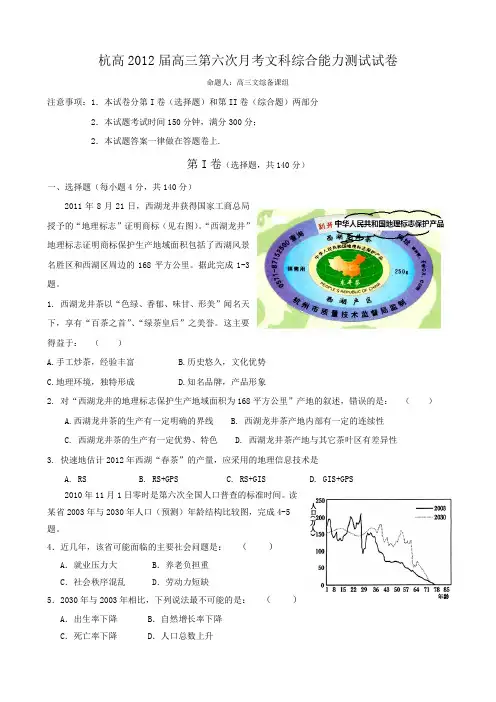
杭高2012届高三第六次月考文科综合能力测试试卷命题人:高三文综备课组注意事项:1.本试卷分第I卷(选择题)和第II卷(综合题)两部分2.本试题考试时间150分钟,满分300分;2.本试题答案一律做在答题卷上.第I卷(选择题,共140分)一、选择题(每小题4分,共140分)2011年8月21日,西湖龙井获得国家工商总局授予的“地理标志”证明商标(见右图)。
“西湖龙井”地理标志证明商标保护生产地域面积包括了西湖风景名胜区和西湖区周边的168平方公里。
据此完成1-3题。
1. 西湖龙井茶以“色绿、香郁、味甘、形美”闻名天下,享有“百茶之首”、“绿茶皇后”之美誉。
这主要得益于:()A.手工炒茶,经验丰富B.历史悠久,文化优势C.地理环境,独特形成D.知名品牌,产品形象2. 对“西湖龙井的地理标志保护生产地域面积为168平方公里”产地的叙述,错误的是:()A.西湖龙井茶的生产有一定明确的界线B. 西湖龙井茶产地内部有一定的连续性C. 西湖龙井茶的生产有一定优势、特色D. 西湖龙井茶产地与其它茶叶区有差异性3. 快速地估计2012年西湖“春茶”的产量,应采用的地理信息技术是A. RSB. RS+GPSC. RS+GISD. GIS+GPS2010年11月1日零时是第六次全国人口普查的标准时间。
读某省2003年与2030年人口(预测)年龄结构比较图,完成4-5题。
4.近几年,该省可能面临的主要社会问题是:()A.就业压力大 B.养老负担重C.社会秩序混乱 D.劳动力短缺5.2030年与2003年相比,下列说法最不可能的是:()A.出生率下降 B.自然增长率下降C.死亡率下降 D.人口总数上升右图为“原料产地、转运站和市场运输成本示意图”,读图,完成6-7题。
6.图中转运站成为最佳设厂区位,其节省的主要运输成本是: ( )A.a2+b2B.a3+b3C.a4+b4D.a2+b2+a4+b47.下列工厂适合在转运站布局的是: ( )A.食品厂B.玩具厂C.钢铁厂D.炼铝厂右图是某锋面附近示意图,实线表示锋线,且正向西北方向移动,虚线范围内是雨区。
杭州二中2011年高三年级热身考英语试卷选择题部分第一部分英语知识运用(共两节,满分30分)第一节:单项填空(共20小题;每小题0.5分,满分10分)从A、B、C、D四个选项中,选出可以填入空白处的最佳选项,并在答题纸上将该项标号涂黑。
1. —What do you think about ________ blue dress in the shop window?—Oh, it’s fantastic! It will make ________ perfect birthday present.A. a; aB. the; aC. a; theD. the; the2. The handbook gives ________ details about the functions of this washing machine.A. steadyB. secureC. potentialD. precise3. The boss said to the secretary, “If you work well, you ________ have a rise as a reward.”A. mustB. shallC. wouldD. ought to4. A good writer is ________ who can express the commonplace in an uncommon way.A. thatB. thoseC. oneD. what5. The number of the students taking part in the English Corner, ________ we had expected, waswell above two hundred.A. thatB. likeC. whomD. as6. I am told that the new law will come into ________ on January 1st next year.A. effectB. useC. serviceD. existence7. The hungry boy kept his eyes ________ on the cake on the table for quite a while before hefinally noticed my presence.A. to fixB. fixedC. fixingD. being fixed8. It’s said that Mary and Joan quarreled yesterday, but they ________ soon afterwards.A. put upB. brought upC. made upD. set up9. —I’ll be away on a business trip. Would you mind keeping an eye on my house?—Not at all. ________.A. I’ve no time.B. I’d rather not.C. I’d like it.D. I’d be happy to.10. Ballet is amazing; ________ you go, you are likely to find yourself going again and again.A. untilB. onceC. unlessD. while11. The moment she heard the manager’s angry voice on the phone,she ________ what shewould have to face.A. had sensedB. has sensedC. sensedD. would sense12. When ________ a job, you should highlight your experience and skills.A. applying forB. applied forC. to apply forD. being applied for13. —Isn’t it cold today?—Yes, a little, but quite warm ________ January.A .in B. on C. for D. by14. He managed to reach the summit of his career, but it was at the ________ of his health.A. consumptionB. consequenceC. expenseD. evidence15. I know she can be very annoying, but ________, I think you should apologize to her for yourrude remarks.A. all the whileB. still lessC. once in a whileD. all the same16. Jessica may come to ask you for help, ________ you might as well tell her about our newconclusion.A. in that caseB. in which caseC. in caseD. in whose case17. Mary was only too ready to help others, seldom, ________, refusing them when they turned tohim.A. if soB. if notC. if anyD. if ever18. George’s aim is to inform the viewers that smoking can lead to lung cancer, ________?A. isn’t itB. can’t itC. is itD. can it19. —We are leaving on June 15.—So why not come to spend ________ days with us? I’m serious.A. all these last fewB. these all last fewC. these last all fewD. all last these few20. We all feel it is Jack as well as his wife that ________ for their son’s bad performance atschool.A. are to blameB. is to be blamedC. are to be blamedD. is to blame第二节:完型填空(共20小题;每小题1分,满分20分)阅读下面短文,掌握其大意,然后从21—40题所给的四个选项(A、B、C、D)中,选出最佳选项,并在答题纸上将该选项标号涂黑。
绝密★考试结束前2012年浙江省普通高中会考英语考生须知:1.全卷分为试卷I、II和答卷I,试卷共8页,有六大题,65小题,满分100分,考试时间90分钟。
2.试卷I的答案必须做在答卷I上;试卷II的答案直接做在试卷II上。
3.请用蓝、黑墨水或圆珠笔将姓名、准考证号分别填写在答卷I、试卷II的相应位置上,用2B铅笔将答卷I上的准考证号和学科名称所对应的方框内涂黑。
试卷I一、听力测试(本题有两节,共15分)第一节(本节有5小题,每小题1分,共5分)1.What color are the shoes the woman wants to buy?A. Red.B. Blue.C. Black.2.How much does the man have to pay?A. $5.50.B. $4.50.C. $5.40.3. How will the woman go to the Science Museum?A. On foot.B. By bike.C. By car.4. When will the man most probably visit Mr Smith?A. Friday.B. Thursday.C. Wednesday.5.What’s the most probable relationship between the two speakers?A. Waiter and customer.B. Teacher and student.C. Doctor and patient.第二节(本节有10小题,每小题1分,共10分)听下面一段材料,回答6—7题。
6.How many rooms does the man want?A. Two single rooms.B. Two double rooms.C. One single room.7.How long will the man stay?A. Three nights.B. Two nights.C. One night.听下面一段材料,回答8—9题。
浙江省杭州二中2021届高三英语第六次月考试题新人教版选择题部份第一部份英语知识运用(共两节,总分值30分)第一节:单项填空(共20小题;每题0.5分,总分值10分)从A、B、C、D四个选项中,选出能够填入空白处的最正确选项,并在答题纸上将该项标号涂黑。
1. --- I would rather have some wine, if you don’t mind.--- _______. Don’t forget you will drive.A. Anything but thatB. By all meansC. Take it easyD. I won’t say no to this2. Usually, mom has conversations with me over _______ telephone, while keeping in touch with David by _______ letter.A. 不填;theB. 不填;aC. the;不填D. the; a3. It’s important for students to _______ half an hour every morning to read English.A. set aboutB. set upC. set asideD. set out4. I know I shouldn’t have accepted anything from such a person, but I found it really hard to turn down his ________.A. suggestionB. requestC. mercyD. offer5. The new machine, as is put in the report, will work twice as fast, _______ greatly reducing costs.A. soB. evenC. yetD. thus6. Lily failed the final examination. She is a diligent student, _______.A. yetB. thoughC. althoughD. besides7. They haven’t arrived yet but we _______ them at any moment.A. are expectedB. have expectedC. are expectingD. will expect8. The novel was completed in 1978, _______ the economic system has seen great changes.A. whenB. during whichC. since thenD. since when9. Many of the creatures in J.K Rowling’s world are not real and much of ________ happens is strange to us.A. whichB. themC. whatD. that10. ________ and we will complete the task sent us.A. Another hourB. An hour laterC. After an hourD. In an hour11. T o deal with the global financial crisis, China has _______ a string of forceful measures over the pastmonths.A. worked outB. found outC. turned outD. made out12. I f you are planning to spend your money having fun this week, better ________ it —you’ve got some big b ills ________.A. forgot; comingB. forget; comingC. forgetting; to be comingD. forget; to come13. I t is said during the World Climate Conference-3 (WCC-3) held in Copenhagen in 2020, some developed countries even refused to ________ to the agreement on carbon emissions.A. contributeB. referC. subscribeD. stick14. N ancy is my faithful friend and quite often she would make me a/an ________ promise that she will help me if needed.A. accurateB. cautiousC. casualD. absolute15. ---What does the sign over there read?---No person _______ smoke or carry a lighted cigarette, cigar or pipe in this area.A. mustB. mayC. shallD. will16. A fter we learned the long passage, Ms. Zhang recommended us to read through it again and try to write a/an ________ of this one.A. adventureB. abstractC. journalD. issue17. S ometimes we will put ourselves in such a kind of situation where there is nothing we can do ________ than wait.A. betterB. ratherC. moreD. other18. T here will be more than 750 projects ________, creating nearly 40,000 jobs starting this summer, including 15,000 in a Youth Conservation Corps.A. startedB. to be startedC. startingD. being started19. ---Where shall we go to spend the weekend?---Nowhere ________, anywhere you like.A. in allB. in generalC. in caseD. in particular20. ---Mr. Black, this is our language lab. Would you like to go in and have a look?---OK. ________!A. Help yourselfB. This wayC. Follow meD. After you第二节:完型填空(共20小题;每题1分,总分值20分)阅读下面短文,把握其大意,然后从21—40题所给的四个选项(A、B、C、D)中,选出最正确选项,并在答题纸上将该选项标号涂黑。
2012年杭州市各类高中招生文化考试模拟测试英语试卷及答案(有听力音频)新世纪教育网精选资料版权全部@新世纪教育网英语听力资料和参照答案及评分标准一、听小对话回答下列问题1--5BACBC二、三、听长对话、听独白回答下列问题6.A7. B8.C9.C10. A11. B12. B13. C14. B 15. C四、单项填空(共15 小题,计 15 分)16— 20 AABBD21— 25 BBBAA26— 30CCBCB五、完形填空 (共 15 小题,计15 分)31— 35 BDACA36---40 AACAB41— 45 DAADD六、阅读理解46-50 ABCBD51— 55 CAACB56-60.BDAFE七、选词填空。
(共 10 小题,计 10分)61.positive62.more confident63.suggestions 64.what65.highpletely66.did68. yourself69.failure70. outstanding八、单词拼写。
(共 10 小题,计 10分)71. twelfth72. minutes ’73. allowed74. out75. sports76. willing,77. happening78. invited79. hungry80. pleasure九、书面表达(共 1 题,计 15 分)I’m really excited these days because this is the first time I have come to Hangzhou, my father’s birthplace. Everything here is interesting to me. The first thing that impressed me greatly is that there are so many cars running in the streets, and many of them are very expensive ones. And there are so many big department stores or supermarkets in the city where you can get almost everything you want. So life here is very convenient. The streets are wide and clean with green trees on both sides, just like those where I live in America. I think it is a good place for living.I find people here are all living a rich and happy life. They wear trendy clothes and behave ina polite way. Many of them live in big and new houses. My cousin Wang Ping introduced some of his friends to me and we also went to see some of our relatives. They are all very kind to me.Besides, we visited the school where Wang Ping is studying. It is said that it is the best school in the city. I find it is not only big and beautiful but also has excellent equipment, like computers in the classrooms. What ’s more, I hear students here receive education for free.What an amazing place it is! I think I have fallen in love with it, and the people here, too. I have got a plan in my mind now — coming to stay in Hangzhou and study here in the next few years. Of course, I have to ask for my parents ’permission first. I ’m sure my parents will support me.新世纪教育网-- 中国最大型、最专业的中小学教育资源门户网站-----版权全部@新世纪教育网。
杭州二中2012届高三第六次月考英语试题选择题部分第一部分英语知识运用(共两节,满分30分)第一节:单项填空(共20小题;每小题0.5分,满分10分)1. --- I would rather have some wine, if you don’t mind.--- _______. Don’t forget you will drive.A. Anything but thatB. By all meansC. Take it easyD. I won’t say no to this2. Usually, mom has conversations with me over _______ telephone, while keeping in touch with David by_______ letter.A. 不填;theB. 不填;aC. the;不填D. the; a3. It’s important for students to _______ half an hour every morning to read English.A. set aboutB. set upC. set asideD. set out4. I know I shouldn’t have accepted anything from such a person, but I found it really hard to turn down his________.A. suggestionB. requestC. mercyD. offer5. The new machine, as is put in the report, will work twice as fast, _______ greatly reducing costs.A. soB. evenC. yetD. thus6. Lily failed the final examination. She is a diligent student, _______.A. yetB. thoughC. althoughD. besides7. They haven’t arrived yet but we _______ them at any moment.A. are expectedB. have expectedC. are expectingD. will expect8. The novel was completed in 1978, _______ the economic system has seen great changes.A. whenB. during whichC. since thenD. since when9. Many of the creatures in J.K Rowling’s world are not real and much of ________ happens is strange to us.A. whichB. themC. whatD. that10. ________ and we will complete the task sent us.A. Another hourB. An hour laterC. After an hourD. In an hour11. To deal with the global financial crisis, China has _______ a string of forceful measures over the pastmonths.A. worked outB. found outC. turned outD. made out12. If you are planning to spend your money having fun this week, better ________ it —you’ve got some bigbills ________.A. forgot; comingB. forget; comingC. forgetting; to be comingD. forget; to come13. It is said during the World Climate Conference-3 (WCC-3) held in Copenhagen in 2009, some developedcountries even refused to ________ to the agreement on carbon emissions.A. contributeB. referC. subscribeD. stick14. Nancy is my faithful friend and quite often she would make me a/an ________ promise that she will help meif needed.A. accurateB. cautiousC. casualD. absolute15. ---What does the sign over there read?---No person _______ smoke or carry a lighted cigarette, cigar or pipe in this area.A. mustB. mayC. shallD. will16. After we learned the long passage, Ms. Zhang recommended us to read through it again and try to write a/an________ of this one.A. adventureB. abstractC. journalD. issue17. Sometimes we will put ourselves in such a kind of situation where there is nothing we can do ________ thanwait.A. betterB. ratherC. moreD. other18. There will be more than 750 projects ________, creating nearly 40,000 jobs starting this summer, including15,000 in a Youth Conservation Corps.A. startedB. to be startedC. startingD. being started19. ---Where shall we go to spend the weekend?---Nowhere ________, anywhere you like.A. in allB. in generalC. in caseD. in particular20. ---Mr. Black, this is our language lab. Would you like to go in and have a look?---OK. ________!A. Help yourselfB. This wayC. Follow me D . After you第二节:完型填空(共20小题;每小题1分,满分20分)You’ve heard the expression, “What you see is what you get.” My grandfather used to say: “If you looked at a tree long enough, it will move.” We see what we want to see. Psychologists tell us that ___21___ controls our lives more than our self-image. We live like the person we see in the ___22___. We are what we think we are. ___23___ you don’t think you’ll be successful, you won’t. You can’t be it if you can’t see it. Your life is ___24___ your vision. If you want to change your life, you must change your vision of your life.Arnold Schwarzenegger was not ___25___ famous in 1976 when he met with a newspaper reporter. The reporter asked Schwarzenegger: “Now that you’ve ___26___ from bodybuilding, what do you plan to do next? Schwarzenegger answered very calmly and ___27___: “I’m going to be the best movie star in Hollywood.“ The reporter was ___28___ and amused at Schwarzenegger’s plan. At that time, it was very hard to ___29___ how this muscle-bound bodybuilder, who was not a ___30___ actor and who spoke poor English ___31___ a strong Austrian accent, could ever hope to be Hollywood’s movie star!So the reporter asked Schwarzenegger how he planned to make his dream come true, Schwarzenegger said: “I’ll do it the same way I became the best ___32___ in the world. What I do was to ___33___ a vision of who I want to be, and ___34___ I start living like that person in my mind ___35___ it were already true.” Sounds almost childishly simple, doesn’t it? But it ___36___! Schwarzenegger DID become the first class highest ___37___ movie star in Hollywood!Remember: “If you can see it, you can be it.” A successful businessman I know wears a shirt with these words on it: “Don’t just pursue your ___38___. Chase them down and tackle them!” You only get one life to live, so why not live the best life possible? So you can be ___39___ satisfied at what you see and ___40___. Just think a minute!第二部分:阅读理解(第一节20小题,第二节5小题;每小题2分,满分50分)第一节:阅读下列短文,从每题所给的四个选项(A、B、C、D)中,选出最佳选项,并在答题纸上将该选项标号涂黑。